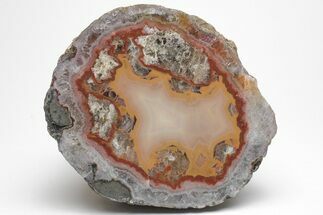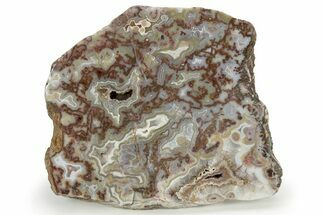POLISHED MOROCCAN AGATES
Both nodule and vein/seam agates come from the Atlas Mountain region in Kerrouchen (also spelled Karouchen or Kerrouchene), Morocco. The agate nodules are known for their intense red, pink, white, yellow, orange and brown agate hues. They formed from silica and iron-rich fluids, within the Triassic-aged basaltic rock. These nodules can reach upwards of 12 inches wide and can be collected from the basalt itself, or more commonly from the apple farms in the valleys where farming exposes these nodules that erode out of the basalt.
Seam Agate, also known by the trade name "Vein Agate", is an agate formation that occurs in small cavities/veins/seams in rock. These seams often occur in areas where the rock has naturally shifted or fractured, resulting in cavities that fill in with minerals, in this case chalcedony (var. agate). Seam agates collected from this site typically showcase a wonderful mixture of distinct red, yellow, orange, pink and/or white colored bands of agate, with plumes or mosses that branch outward from the seam walls. They also occur within the basaltic rock, which makes sense considering natural fracturing that occurs as basaltic lava cools.
Agate is a variety of microcrystalline quartz (chalcedony) that displays translucence and, in some cases, banding. Agate primarily forms when silica-rich fluids fill pockets within rock and/or fossils, depositing silica on exposed surfaces. This process can result in banding patterns as the composition and impurities of the fluids change over time. These banding patterns can either form as flat layers called waterlines or as rounded layers, depending on the surfaces available for deposition.
Seam Agate, also known by the trade name "Vein Agate", is an agate formation that occurs in small cavities/veins/seams in rock. These seams often occur in areas where the rock has naturally shifted or fractured, resulting in cavities that fill in with minerals, in this case chalcedony (var. agate). Seam agates collected from this site typically showcase a wonderful mixture of distinct red, yellow, orange, pink and/or white colored bands of agate, with plumes or mosses that branch outward from the seam walls. They also occur within the basaltic rock, which makes sense considering natural fracturing that occurs as basaltic lava cools.
Agate is a variety of microcrystalline quartz (chalcedony) that displays translucence and, in some cases, banding. Agate primarily forms when silica-rich fluids fill pockets within rock and/or fossils, depositing silica on exposed surfaces. This process can result in banding patterns as the composition and impurities of the fluids change over time. These banding patterns can either form as flat layers called waterlines or as rounded layers, depending on the surfaces available for deposition.
Polished Slabs
(2)
Spheres
(2)
92 Items
($19 to $245)
 Reviews
Reviews





























